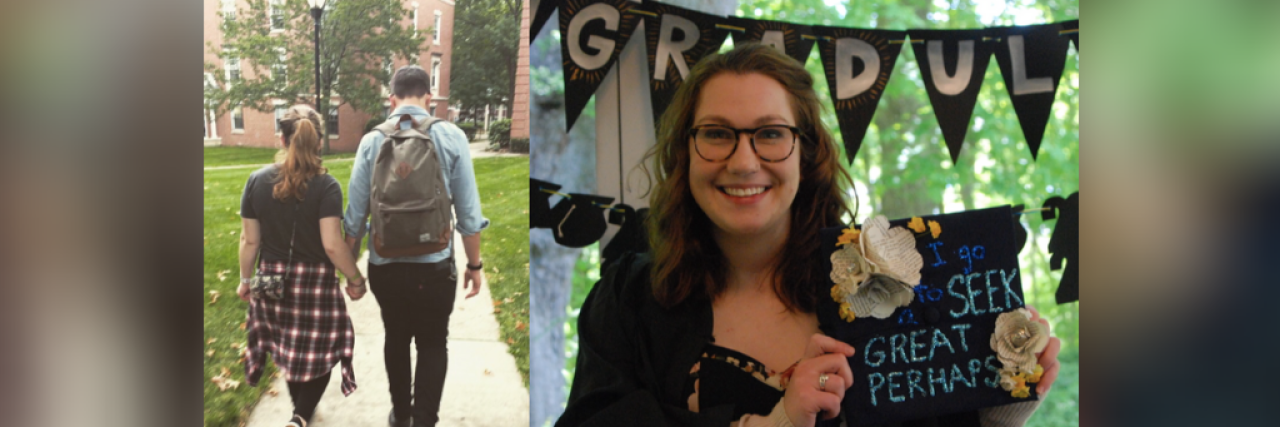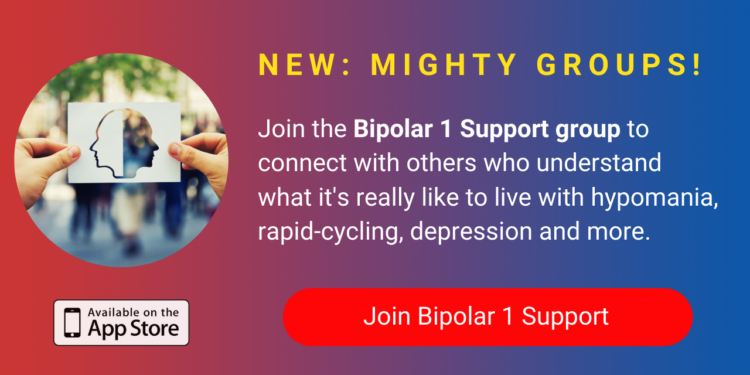I sat on the steps outside my apartment, watching my roommate tell her side of the story to a police officer while another cop asked me questions. I called my boyfriend, half-convinced that he would break up with me on the spot, but I was so alone and I had no one else to call. My roommate’s mom arrived and took her away, and then an ambulance came for me. In the ER, I lied to myself and the doctors all the way through a psych evaluation. They kept me overnight, and then sent me home. In hindsight, they should have admitted me. If I had been honest, they would have.
Eighteen hours before the cops showed up, I was walking to a yoga class with my roommate. She said something kind of mean about my boyfriend, and I lost it. I walked away and called my boyfriend to spend the night with him. I was so angry about this vaguely unkind comment that I couldn’t stand to be in the same apartment with her. I went to work from his place in the morning and when I came home the next day, she insisted we talk it out. Instead, I got angrier and angrier until I was screaming at her. I completely lost touch with reality. I was dissociating and completely out of control. I wanted to stop, I wanted to walk away, but I couldn’t. She became so scared of my mental state that she called the police, which freaked me out so badly that I attacked her. That’s what landed me in the ER for 18 hours while I lied my way through a psych evaluation and insisted I was OK.
I was not OK, and six months later I would wind up in that same ER, this time hoping to be admitted. I was suicidal, and I was finally being honest with myself that something was very wrong, and I needed help.
My story starts at 4 years old, accidentally watching the September 11th attacks on television when they interrupted my cartoons. That triggered late-night panic attacks over the sounds of airplanes overhead, certain they were going to crash into my house, or land on the roof and bring “bad guys” who would hurt my family. From preschool I struggled with anxiety-fueled insomnia, and some of my earliest memories are of being anxious. Over the next few years, I developed obsessive-compulsive symptoms, sensory processing issues and social anxiety.
I had panic attacks at summer camp when forced to put sneakers on wet and sandy feet. I struggled to make and maintain friendships in elementary school, always feeling like my classmates were speaking a language I didn’t understand. At 8 years old, I stared at my leotard and tights in the mirror at ballet class and wished I were skinnier. By the time I was entering middle school, I was experiencing bouts of debilitating depression and being bullied. Many days, I couldn’t get out of bed and was chronically late to school. I was bullied for being a “teacher’s pet” and “trying too hard.” Any friendships I had from elementary school evaporated as I became dysfunctionally anxious and depressed.
I struggled to attend school and was threatened with repeat years and truancy officers. I couldn’t get out of bed. I was terrified of the bullies in my classes, and the bullies in my head. I was brutal to myself. I started cutting calories until I was losing consciousness in dance class. The closest friend I had was a boy who I relied on to feel valuable. I begged him to love me, to save me from my mental illness by loving me when I couldn’t love myself. He knew better, he knew he couldn’t do that, and we stopped spending time together. I was heartbroken, hungry, self-harming and ultimately suicidal. One day, I walked into school hours late, and told to go to my guidance counselor. She wasn’t in her office, and I had reached the end of the line. I was ready to walk back out the front doors and do something I could never take back.
My English teacher showed up at the last minute and saved me from taking my life. She was the first person who told me that I was not a failure, a screw-up—I was sick. I was diagnosed with depression, OCD and anxiety and began therapy. Six months later, I was eating properly, taking medication and on track to graduate. I tried cheerleading and horseback riding and gymnastics, but eventually came back to ballet with a much healthier mindset.
I thought that was it: I thought that with medication and therapy, I could be well for the rest of my life. I graduated high school like a big middle finger to every teacher and guidance counselor who told me I couldn’t. I walked across that stage with a shit-eating grin. I started college at my dream school. I made some incredible friends. I was on top of the world.
Until I wasn’t.
It began with a girls’ trip to Martha’s Vineyard in the fall of my junior year, in 2017. One of my friends had a family house on the Vineyard and we took a road trip out there for a weekend. I was furious to discover that my friends had invited one of their boyfriends to join us. I didn’t say anything about not wanting him to come and instead seethed with rage for the whole weekend, eventually getting into a screaming, shoving fight with my best friend.
In retrospect, I can’t even remember why I was so angry. It was an emotion that was completely detached from reality; I screamed and fought like my life depended on getting my way. Like a toddler. I am horrified to look back on it, and afterward I felt as though I was recovering from a serious bout of flu. I was exhausted, weak and shaky, crying constantly. When we got home from that trip, I went to see my psychiatrist, who was prescribing my antidepressants. He put me on a medication that he described as a booster for my antidepressants, to help manage what he perceived as severe anxiety resulting in mood swings.
Over the next year and a half, I had more episodes of extreme and completely unfounded anger. I would scream at my friends, throwing fits and getting angry over nothing. I felt like a raw nerve at all times; anything and everything could set me off. I picked fights over things I didn’t care about. My roommate got engaged and instead of being happy for her, I told her all the reasons he was wrong for her. I perceived some great and terrible truth about their relationship that she couldn’t see. She resented me for it. The doctor continued increasing my medication doses, until I was medicated into a fugue state. When I wasn’t a zombie, I was angry, irritable, picking fights with my best friends over nothing in particular.
In April of 2019, she made an unpleasant comment about my boyfriend that set me off. I spent the night with my boyfriend so I wouldn’t have to see her, and the next day we got into the worst fight of my life. I screamed at her until she was so afraid, she called the police. I tried to grab the phone out of her hands and when that didn’t work, I threw my heavy metal water bottle at her. I ran out of the apartment and walked around the block, crying and talking to myself. “I’m not crazy,” I muttered, “I’m not crazy. I’m not crazy.”
While I was in the ER, my roommate moved out and has not spoken to me since. I don’t blame her. I would be scared of me, too. I am scared of me. The following October, I finally admitted to myself that I needed help. I didn’t want to die, but I didn’t trust myself either. I checked into the ER and spent a week in a psychiatric hospital. I was diagnosed with bipolar disorder.
I began a regimen of mood stabilizers that save my life every single day. My medication gave me back a mind that I lost a long time ago, and suddenly my life was my own again. I recognized my psychotic rages as an unusual manifestation of mania, and they receded with the medication. I sleep better, I think more clearly, I have very rare panic attacks and no blinding rage. I am healthier than I have possibly ever been in my life.
But it came at a price. I lost my best friend. We called each other “nonbiological twins.” We were soul sisters, the best friends either of us had ever had. I live every day in fear of the monster that I know lives within me. I don’t ever want to try to hurt the people I love ever again. I don’t want to hurt myself.
I have begun raising money to get a psychiatric service dog, who will help me make sure that what happened in April of 2019 never happens again. A dog will change my life, give me peace of mind that there is something besides my own broken mind in between sanity and the raging monster who tried to hurt my best friend. A dog could provide grounding during mania, interrupt self-harming behaviors, help me regulate my sleep cycle, remind me to take my medication, alert to panic attacks and so much more. Psychiatric service dogs are less common than guide dogs, mobility dogs or seizure alert dogs, and so there are fewer resources available to obtain them. They are still, however, life-saving and medically necessary for people like me. I am fighting every single day, and I live in fear of becoming that sick again. There is so much stigma around mental illness, and disorders like bipolar in particular, that it is very hard to ask for help in this way.
That stigma keeps people like me from getting help when they need it. I was so afraid of being “crazy” I couldn’t admit to myself or the doctors that I needed help when I was literally in the hospital for psych evaluation. It is so hard to admit that something is wrong when there is so much pressure to be “OK.”
It’s OK not to be OK. I wish I could go back to April 2019 and shake that scared girl out of her denial. I needed help, and there should be no shame in asking for it. Checking myself into the ER and committing myself to the hospital was one of the hardest things I have ever done, but it very well may have saved my life. I beg anyone else in a similar position to get help. It may be hard to believe in your darkest moments, but your life matters, and it does get better. There is always hope.
Image via contributor


